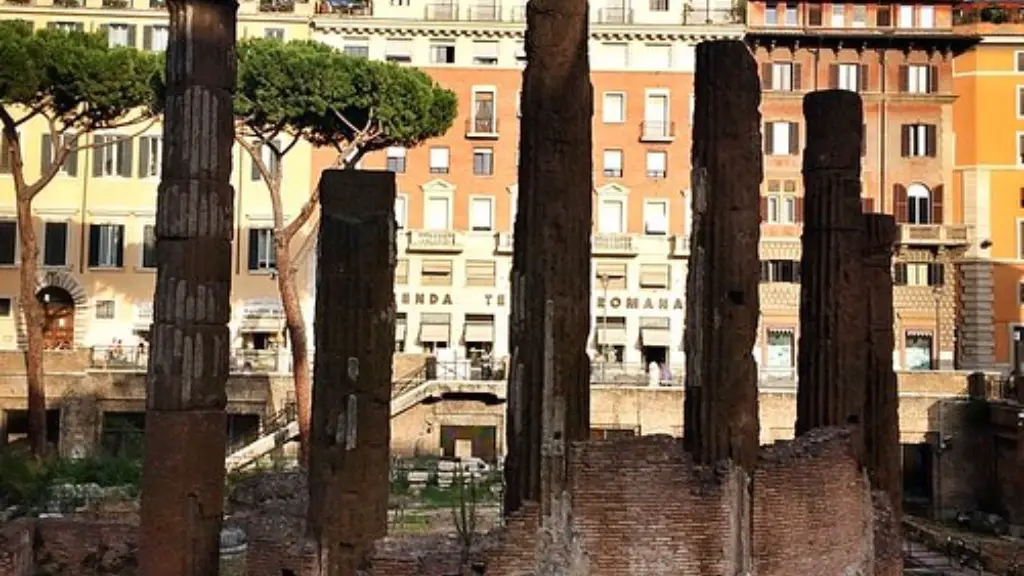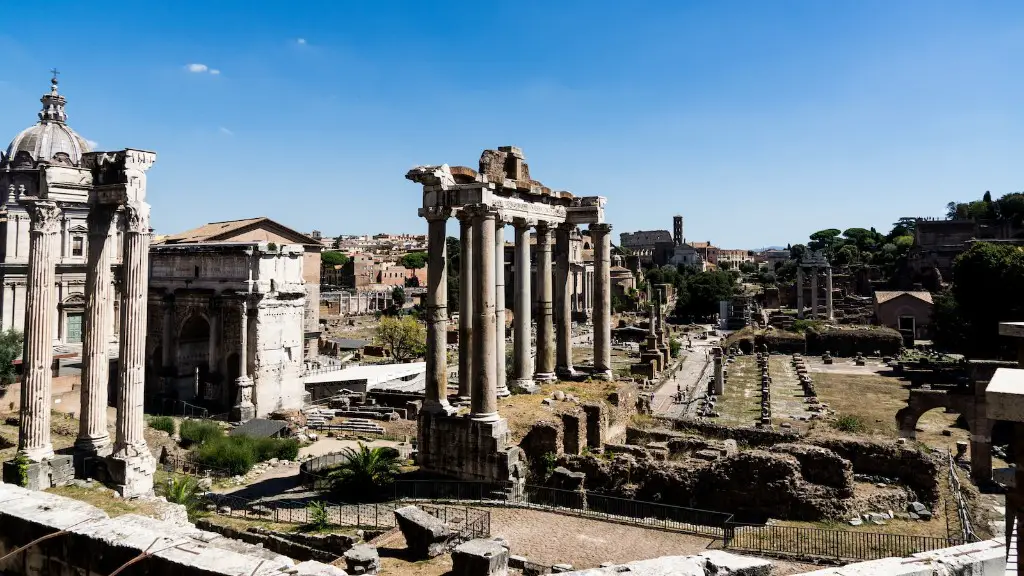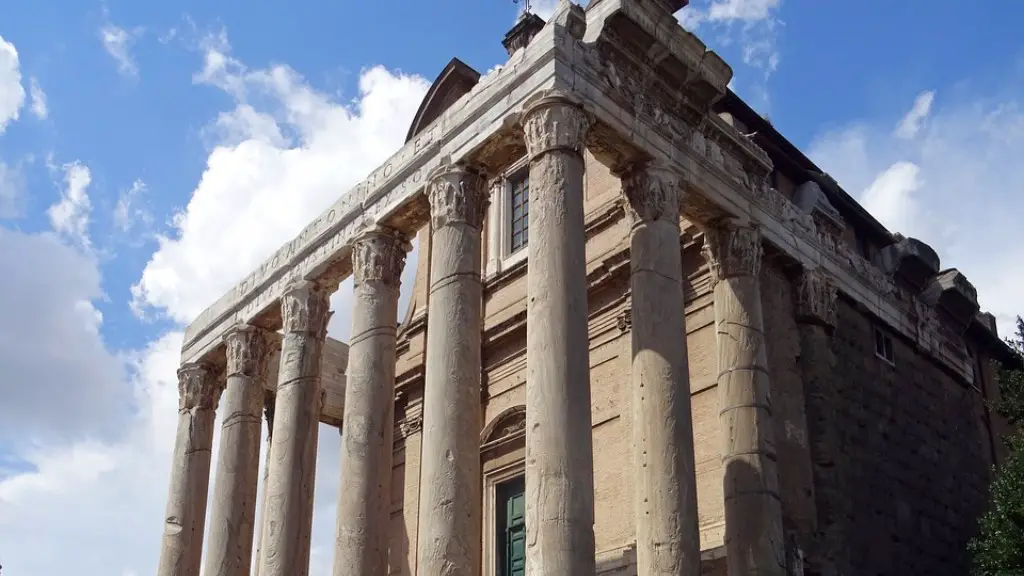Alt Right and the Discourse of Ancient Rome
The Alt Right is a loosely-defined far-right movement that seeks to promote white-nationalism and anti- immigration policies. The movement includes neo-fascists, ultra-nationalists, and white nationalists, among other voices in the far-right. It has recently become active in the fields of popular culture and politics due to its sometimes aggressive language and rhetoric.
Interestingly, many Alt Right proponents are passionate admirers of ancient Rome. For example, Spencer frequently employs references to Rome as a means of expressing support for his views, often quoting ancient Roman literature. He has even gone so far as to state that if his political views were implemented, America would become the “American Imperium”, drawing on the framework of the Roman Empire.
The use of Roman rhetoric within the Alt Right has been the source of much debate amongst experts. On one hand, many argue that it serves as a valuable example for the movement, providing a coherent and structured ideology for their views to take shape. The history of ancient Rome is commonly cited as an example of successful nationalist and expansionist policies. The United States, an idea conceived in part as an answer to European monarchism, is often framed within this narrative.
On the other hand, an even greater number of people have argued that Alt Right rhetoric has been appropriated in a brutally political manner and lacks proper respect for the history, culture, and legacy of ancient Rome. Roman socialism, class-consciousness, and tolerence in the face of cultural and religious difference have been cast aside in the process. It is important to note that modern scholars and historians have debated the merits of ancient Rome’s accomplishments for many years.
Regarless of experts’ nuanced views on the movement, it is clear that the Alt Right has adopted rhetoric from ancient Rome and used it to their advantage. Moreover, the Alt Right’s interpretation of Roman history is extremely narrow in scope and does not account for many of the complex social and political processes that made ancient Rome great. In the end, what is clear is that the Alt Right is using ancient Rome as a tool for their own political and cultural ends.
Alt Right and Christian Values
The Alt Right has been tied to the wider issue of religious views. Specifically, the movement has been tied to a Christian worldview, where traditional values and Judeo-christian morality are paramount. In many respects, this stance is reflected in the tendency to invoke classical Roman values and use them to frame their views.
In many respects, the Alt Right’s use of Roman values demonstrates an admiration of the Roman model of a “strong state”. This has been used to defend their pro-law enforcement and anti-immigrant stances. These values also often appear in discussions about the importance of traditional morality and patriarchy. They are presented as the only way to keep society from descending into chaos and stagnation.
At the same time, it is important to note that modern scholars and historians disagree about whether ancient Rome was truly a place of moral and spiritual virtue. For example, some argue that Rome was a place of immense brutality, where social mobility was near non-existent and where the Roman state often employed violence and harsh laws to maintain order. As such, it is important to consider the fact that ancient Rome is highly contested ground in the realm of historical debate, and that not all interpretations of its past are equally valid.
In the end, it is clear that the Alt Right’s interpretation of classical Roman values is highly selective and partisan. To what extent this is effective in winning over public opinion is debatable, but it is clear that a large number of people find the rhetoric persuasive. Whether or not this rhetoric is valid is a debate best left to experts in the field, but it is important to note that the Alt Right has successfully tapped into strong feelings of nostalgia and admiration for Classical Rome and its legacy.
Alt Right and Machismo
Another reason for the Alt Right’s embrace of ancient Rome is its use of machismo. Machismo is deeply rooted in Roman culture and was often used to portray Roman men as strong, powerful, and unafraid to make difficult decisions. For example, the famous story of the two Roman soldiers condemning the city of Carthage to complete destruction captures the idea that Romans were strong-willed and disciplined, willing to do whatever was necessary to protect their state and their way of life.
The Alt Right has used this idea as a way to frame their own views as tough, strong-willed stances that challenge supposedly “weak” liberal rhetoric. For instance, they often portray their “closed borders” policies as a sign of strength and a refusal to be pushed around by other countries. This ties back to the idea that traditional values and morality are key to national greatness and stability—a view that was deeply rooted in Ancient Rome.
Of course, it is important to note that machismo is a deeply problematic concept and one that has been used to excuse and condone horrific acts throughout history. It has often been used to frame tough stances on immigration as necessary and desirable, while ignoring the immense suffering such stance cause. In this way, it is important to note that while machismo has been used by the Alt Right to frame their views, its implications should be scrutinised in depth and not simply accepted wholeheartedly.
Alt Right and the Allure of Superpower
Finally, it is important to note the role of nostalgia in driving the Alt Right’s embrace of classical Rome. It is clear that the vast majority of Alt Right supporters feel a strong sense of nostalgia for the era of Roman greatness. From the Punic Wars to the establishment of the Pax Romana, the thought of a powerful, unified nation stretching from the Baltics to the Middle East conjures up images of national pride and awe-inspiring grandeur.
The Alt Right has tapped into this sentiment as a way to express respect for their nation’s past and to portray their vision for the future as a reflection of this greatness. As such, many of the Alt Right’s policies are framed as necessary to ensure that their nation’s current strength is not undermined by external forces. This of course is deeply problematic, as the reality of American power is not to be compared to Rome’s.
It is also important to note that the cost of attempting to recreate the grandeur of Rome was immense. From the cost of imperialism to the ensuing civil wars, it is clear that the allure of superpower can lead to disastrous outcomes. As such, it is important to bear this in mind when discussing the Alt Right’s admiration of classical Rome and to ensure that any admiration is grounded in respect for the true tragedy of Rome’s past.
Alt Right and ‘Race Matters’ Theory
The Alt Right’s embrace of ancient Roman values has also been linked to the “race matters” school of thought. This school of thought centres around the idea that race is the single most important factor in determining how society functions. In the context of the Alt Right, this has been used to argue that white nationalism is the necessary first step towards establishing order and stability.
This perspective is seen in the rhetoric of many Alt Right leaders, who argue that the key to making “great” nations is to identify the racial makeup of such nations and to ensure that such races are represented in the country’s politics and institutions. This links directly to the views of classical Roman leaders, who often argued that expanding their empire meant ensuring that their “racial purity” was maintained.
Of course, this view has been criticised by many as being deeply problematic and overly simplistic. It is clear that such a view ignores both the complexity of social dynamics within a given nation and the importance of cultural and religious inclusion in any nation-building process. Nevertheless, it is clear that the Alt Right has appropriated the “race matters” view of classical Rome and is using it to push their own divisive agenda.
Alt Right and Language of ‘Us vs. Them’
Finally, the Alt Right’s embrace of classical Roman rhetoric has been linked to their use of the language of “us versus them”. This language is seen in their rhetoric, where opponents are often vilified as “the enemy” or “the other”. This is often justified under the guise of “protecting American freedoms”, though such rhetoric is often misleading. Moreover, it is used to create “in” and “out” groups in order to establish a strict binary of who is allowed to hold power and who should be excluded.
It is also clear that such language was used by classical Rome to frame their own imperialist expansion. From Julius Caesar’s campaigns to Marco Aurelius’ campaigns in Germania, the language of “us versus them” was used to convey a message of absolutist power. This message is echoed in the use of language by Alt Right figures, who similarly argue for the defence of national greatness and the exclusion of “the other”.
It is important to note that, while such language has been used to powerful effect in the context of politics and warfare, it can also have damaging effects on civil society. By creating divisions between different groups, language like this reinforces existing power structures and can lead to increased incivility and animosity between individuals. In this way, it is possible to see why this language has been viewed as problematic, especially when used to propagate the alt Right’s often extreme and divisive views.
Alt Right and Social Media
One of the most important factors in the Alt Right’s growth over the past few years has been the emergence of social media. Social media has provided a platform for Alt Right figures to spread their messages, often with intense speed and reach. This is because of the Alt Right’s aggressive use of platforms such as Twitter, YouTube, and Reddit, which is often facilitated by their use of inflammatory language and violent imagery.
This strategy has proven extremely effective, with social media providing a platform for Alt Right figures to spread their messages and court public opinion. This has been especially effective in the U.S., where political polarization has led to both sides feeling increasingly alienated and disconnected. In this way, it is possible to see why the Alt Right has been able to tap into the increasing political divide to court support and push their own agenda.
At the same time, it is important to note that social media can be a double-edged sword. From hate speech and doxxing, to harassment and trolling, the dark underbelly of modern social media can be seen in the way the Alt Right has been able to spread their ideas without pushback. As such, it is important that social media companies recognise the dangers posed by the Alt Right’s use of their platforms, and take steps to ensure that their platforms are not used to spread hateful and divisive views.
The Future of the Alt Right
Given the successes of the Alt Right in recent years, it is worth considering what the future holds for the movement. It is clear that the Alt Right’s embrace of classical Roman values, language of “us versus them”, and aggressive use of social media have been major factors in their rise. As such, it is important to consider what the future holds for the movement, and how it can be countered.
The first step is to understand why such rhetoric and tactics have been effective in the past. If the roots of the Alt Right’s success can be identified, then it may be possible to develop strategies to counter their message. For example, it is important to take into account the ideological roots of the movement. By dissecting the history, motives, and goals of the Alt Right, it may be possible to develop a counter-narrative of national strength and unity that does not rely on aggressive or exclusionary rhetoric.
It is also important to consider how the Alt Right’s use of language and social media can be countered. For example, it is worth considering how platforms such as Twitter, Reddit, and YouTube can be better moderated to limit the reach of divisive and inflammatory messages. In addition, efforts must be made to promote a more civil discourse, by encouraging open dialogue and debate between opposing sides





